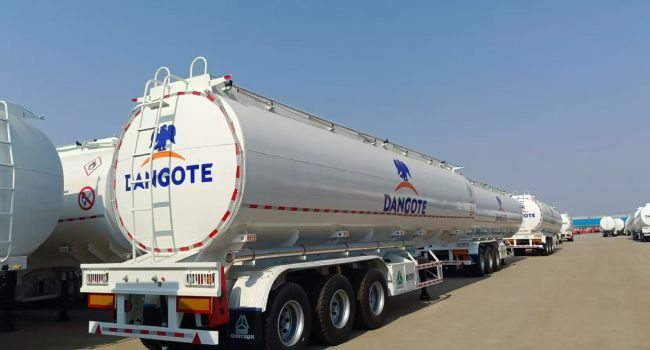
Dangote Refinery’s fleet of 4,000 Compressed Natural Gas (CNG)-powered trucks officially began loading petroleum products on Monday, signaling the start of a direct nationwide fuel distribution program aimed at transforming Nigeria’s downstream sector.
At the refinery’s gantry, the newly deployed trucks took turns loading Premium Motor Spirit (PMS) and Diesel for immediate dispatch to filling stations across the country. The programme, initially scheduled to commence mid-August, had been anticipated since the announcement of the refinery’s acquisition of the CNG fleet.
During a recent meeting with the AfricaRice Centre at his Lagos office, Aliko Dangote, the founder and chairman of the Dangote Group, reiterated that the decision to bypass third-party carriers was both a strategic business choice and a national imperative.
“This move will help reduce our reliance on intermediaries in fuel distribution and optimize the supply chain to benefit Nigerian consumers,” Dangote said.
However, the Depot and Petroleum Products Marketers Association of Nigeria (DAPPMAN) raised concerns last week, accusing the refinery of offering preferential pricing to international buyers while charging higher rates domestically. They welcomed the refinery’s entry into the market but noted that it currently meets only about 30 to 35 percent of Nigeria’s national fuel demand. They also criticized the refinery for not providing free product delivery and accused it of attempting to monopolize the downstream sector through aggressive pricing and bypassing traditional marketers.
In response, the Dangote Refinery clarified its rationale for abandoning the Single Point Mooring (SPM) system, an offshore loading method that incurs an additional ₦75 per litre handling fee. The refinery estimates that using SPM would have added an unnecessary ₦1.5 trillion annually to operational costs.
According to the refinery’s statement, “Loading 40 million litres of PMS and 15 million litres of AGO (diesel) via SPM would incur these avoidable charges every year. Using gantry loading combined with direct trucking eliminates these fees entirely, creating savings that can be redirected toward critical infrastructure projects.”
Dangote emphasized, “It is not sustainable to lose ₦75 per litre to intermediaries who cannot guarantee timely delivery to the Nigerian consumer. We are committed to transparency and partnering with credible distributors to ensure affordable fuel access across the country.”
The 4,000 CNG truck initiative represents a major investment exceeding ₦720 billion. Launched in August 2025, the programme is designed not only to drastically reduce fuel distribution logistics costs but also to cut environmental pollution caused by traditional diesel-powered transport. Furthermore, it aims to positively impact over 42 million micro, small, and medium enterprises (MSMEs) by lowering their energy and transportation expenses.



